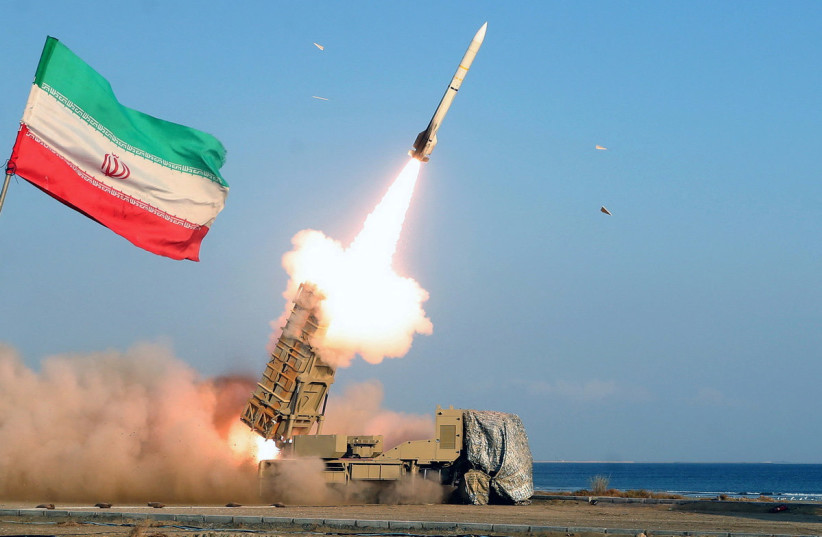Iranian President Ebrahim Raisi attacked the proposed “reactionary” Israeli-Saudi normalization deal, as Defense Minister Yoav Gallant is to head to Washington to meet with US Secretary of Defense Lloyd Austin and discuss security issues relating to that agreement and Iran.
Islamic countries that move toward normalized ties with the Zionist regime are on a “reactionary and regressive path,” Raisi said on Sunday, alluding to Saudi Arabia as he spoke at the International Islamic Unity Summit in Tehran.
Raisi called on the community of Islamic believers to unite against the crimes committed by the “agents of the United States and the Zionist regime,” as he emphasized the importance of freeing Palestine and Jerusalem.
“No concerned people in Palestine, Lebanon, and other Islamic countries are talking about compromise” and are instead focused on “resistance and standing against the enemy,” an option that will force retreat, Raisi said.
Today in Palestine, he said, the initiative comes from those who are engaged in jihad, a holy war.

He spoke as Washington and Riyadh are advancing toward a security pact that would require the US to respond to an attack against Saudi Arabia, including by Iran.
National Security Council Adviser Tzachi Hanegbi told Army Radio that the US for the first time is considering such a pact, which it has not signed with any other country since 1960.
“This is very important to the Saudis,” Hanegbi said. “The big drama here is that the US is taking it upon itself to protect Saudi Arabia against Iran,” he explained, noting that this has been particularly important to Riyadh since Iranian drones attacked its oil fields in 2019. Tehran has denied involvement in the attack.
Riyadh also wants a civilian nuclear program that includes uranium enrichment, Hanegbi said, as he dismissed the concerns of those who fear it could be used to militarize the program and allow Saudi Arabia to produce a nuclear bomb.
This deal will not harm Israeli security, Hanegbi said, stating that Jerusalem and Washington are completely aligned with regard to the safeguards needed for a Saudi nuclear program.
Prime Minister Benjamin Netanyahu and US President Joe Biden discussed a proposed Saudi deal that could also include an American-Israeli security pact when they met in New York last month.
Netanyahu held security consultations with Gallant on Sunday, with a focus on Iran, after Gallant accepted an invitation by Austin to visit Washington in October.
“At their meeting, the two will discuss ways to strengthen the special security ties between Israel and the US, and discuss the various security challenges and political opportunities in the Middle East,” the Defense Ministry said.
It would be the third face-to-face meeting between the two men, but the first in Washington. Until his meeting with Biden, Netanyahu had banned his ministers from visiting Washington.
The meeting comes as Iran continues to push toward a nuclear weapon capacity and United Nations Security Council Resolution 2231 is set to expire this month. It had banned Iran from developing long-range missiles capable of carrying a nuclear warhead.
Britain, France, and Germany said on Thursday they would retain ballistic missile and nuclear proliferation-related sanctions on Iran even after the resolution expires.
Israel has urged the international community to take a strong stand against Iran’s push for nuclear weapons, particularly now that it has enriched uranium to 60%.
It has also worked to prevent Iranian military entrenchment along its northern border and in Syria.
The Israel Air Force reportedly carried out an attack early Sunday morning on an Iranian arms shipment in Syria, west of the capital Damascus, according to several Syrian media reports in the country.
The US Defense Department, however, took a more moderate line on Iran in a report it published on Friday called the “Strategy for Countering Weapons of Mass Destruction” in 2023.
The report said that “it is assessed that Iran is not pursuing a nuclear weapons program at this time.”
The report stressed, however, that Iran “has the capacity to produce enough fissile material for a nuclear device in less than two weeks.”
It’s a conclusion that confirms statements US Defense officials have already said in the last half year. But the fissile material is only part of what Iran needs to complete a nuclear bomb and other components such as a nuclear warhead that can be placed on a long-range ballistic missile that has yet to be developed.
Israel warned that Iran's pursuit of nuclear weapons is a global threat
Israel has long warned that Iran’s pursuit of nuclear weapons is a top global threat, but the US stated that, when it came to weapons of mass destruction, it was most concerned with China and Russia.
Those two nations “present the principle weapons of mass destruction challenge,” the report stated. North Korea, Iran and violent extremist organizations “remain persistent regional threats that must be addressed,” the report explained.
The US, in its report, accused Iran of noncompliance with obligations made under the Chemical Weapons Convention.
“For example, Iran has not submitted a complete chemical weapons production facility declaration” as required under the Chemical Weapons Convention, the report stated.
“The US is also concerned that Iran is pursuing dual-use central nervous system acting chemicals of offensive purposes,” the report added.
Reuters and Jerusalem Post Staff contributed to this report.
